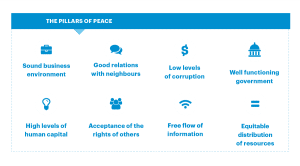July 30, 2015, published in Vision of Humanity
Merely studying violence is not enough. We must also understand what drives sustainable peace.
Every year the Global Peace Index analyses mammoth amounts of data to measure global peace levels, with 162 countries listed from most to least peaceful.
So what exactly are the world’s most peaceful societies doing right?
Analysis by the Institute for Economics and Peace has found eight key factors can help countries create Positive Peace – the structures, attitudes and institutions that underpin peaceful societies.
These eight factors not only sustain peace but also support an environment where human potential flourishes. They interact in complex ways, are multidimensional and are generally slow moving.
Through a stronger understanding of what makes societies peaceful it may be possible to then replicate these attributes, increasing the stability in countries with worse scores on the Global Peace Index.
Positive Peace is a cross-cutting facilitator of progress, making it easier for individuals to produce, businesses to sell, entrepreneurs and scientists to innovate and governments to effectively regulate.
Considering the eight Positive Peace factors can provide a basis for empirically measuring a country’s resilience, or ability to absorb and recover from shocks. It can also be used to measure fragility and to help predict the likelihood of conflict, violence and instability.
This also provides a measure for policymakers, researchers and corporations to use for monitoring and evaluation efforts. Without the appropriate measures and understanding of the factors that support peace, it is not possible to know what policies work and what programmes need to be implemented, when, how and where.
“Positive Peace lies at the centre of understanding and addressing the multiple and complex challenges the world faces.”
Peace is an essential prerequisite to overcoming global challenges such as climate change, decreasing natural resources and increasing migration and overpopulation. Without peace it will not be possible to achieve the levels of cooperation, trust and inclusiveness necessary to solve our challenges, let alone empower the international institutions and organisations necessary to address them.
Read the original article here.


Leave A Comment
You must be logged in to post a comment.